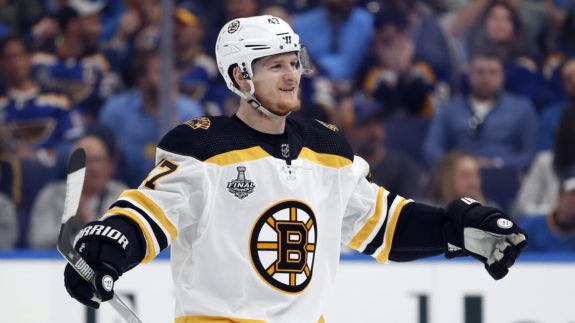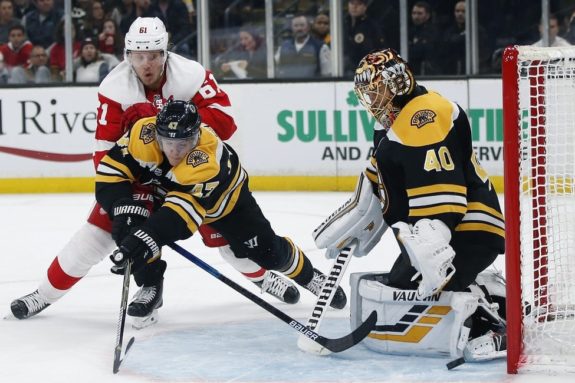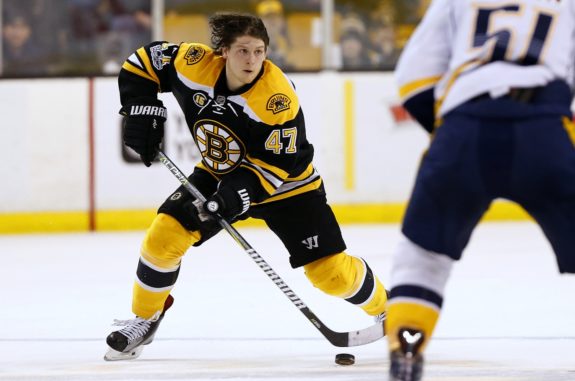The Boston Bruins should definitively make their efforts to re-sign Torey Krug before the trade deadline in 2020 a priority once their solution for their current RFA crop is concluded. Krug is coming off a four-year deal that paid him $5.25 million annually and $21 million over the course of the contract. They should not be letting go of Krug for anything short of a king’s ransom and they must only look at trading him as the last option. And even a highly-priced sum of a contract would not be too little to offer for Torey Krug.
Numbers Back Up Krug’s Value
Krug’s sustained aid to the once-woeful Boston man-advantage cannot be understated. Since joining the team on a full-time basis in 2013-14 and taking over the duties as the primary powerplay quarterback for the franchise, the Bruins rank third in the NHL (trailing the Washington Capitals and Pittsburgh Penguins) in power-play percentage with a sterling 22.0% rate.
In the postseason over a slightly extended span (from the spring of 2013 onward), Boston has the top playoff power-play unit at a staggering 26.8%. Of course, the emergence of Brad Marchand, David Pastrnak and Patrice Bergeron as top-echelon offensive forces has been a strong part of that bump – but I would wager the greatest single influence on Boston’s emergence as one of the league’s most dangerous man advantages is Krug.

Certainly, Krug’s presence on the blue line has helped Boston over the past half-decade plus. According to Evolving-Hockey, only six defensemen have demonstrated a higher value above replacement with the power play (Kevin Shattenkirk, Brent Burns, John Carlson, Kris Letang, John Klingberg and Keith Yandle). And according to the same site’s metrics, Boston’s No. 47 has the 16th-best resume by goals above replacement of any defenseman leaguewide during that span – not bad for someone often considered a ‘second-pairing defenseman’ by some around the hockey world.
In this author’s opinion, Krug has been a top-pairing caliber defenseman for a half-decade. The Bruins’ have deployed him more in a second-pairing role to minimize the effects of his ‘defensive deficiencies’. However, despite getting outmuscled in some matchups in the corner and the net-front he’s actually a solidly above-average even-strength performer according to Evolving-Hockey’s even-strength Corsi per 60 minutes metric. His ability to produce clean zone exits and nifty zone entries should not be underestimated.
Some Comparable Contracts
Given the aforementioned areas of outstanding performance (as a powerplay dynamo and an all-around plus defenseman) one might think that Torey Krug would be primed to cash in big as he approaches unrestricted free agency. Although he lacks ideal size or significantly above-average defensive metrics, his closest comparables are guys like Carlson who signed in June 2018 for eight years at $8 million per year for a total of $64 million. Now Carlson probably took a hometown discount on that deal and probably could have seen upwards of $9 million per annum. Krug isn’t as complete a player as Carlson, but his production warrants a deal in that range.

He (Krug) won’t get as much as Erik Karlsson got from San Jose because he doesn’t have the same track record of prolonged greatness that Karlsson has. He shouldn’t get as little as a guy like Tyler Myers just got (six years, $30 million) because he’s a vastly superior player. Jacob Trouba provides us with an interesting case-analysis because he’s not as good offensively as Krug (only one year with 50-plus points, 2018-19) but there’s a good argument to be made he’s superior defensively, however, he was a restricted free agent when he signed (for seven years, $56 million – an $8.0 million average annual value). This author opines that Krug’s next contract should come in somewhere between $7.5 and 9 million annually for no less than five years.
Show Krug the Money
Ideally, the Bruins could fit Torey into their plans. Krug deserves it and Boston would benefit greatly by keeping him, but if they can’t shell out that kind of dough for reasons extending beyond David Backes’ cap number (it will still be on the books in 2020-21) then they should put all their effort into moving Krug well before the deadline to maximize his value and ensure that the Bruins don’t lose a critical asset for nothing.

But few deals could match the prospect of keeping Krug for next year and beyond. He’s already the best offensive defenseman in a Black and Gold sweater in a generation, losing him could severely impact the B’s.